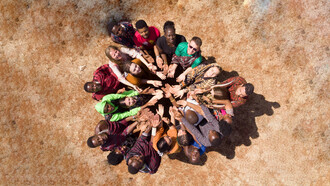How many times have we wondered if our life lived up to our expectations, or if our work satisfied us, but above all, if we were really happy?
Humans have always wondered what can really make them happy and what is harmful to them. Since the times of ancient Greece with the spread of "eudemonistic" philosophies that had the aspiration to seek happiness the mentality of man changed, facilitating introspection and the ability to analyze within himself. In particular, Seneca, a latin philosopher, and author sought much for his inner happiness: he identified precepts and rules of life that served, for example, not to fall into material temptations or desires. In fact, he argued that the true sage is not the one who lets himself be carried away by emotions but is the one who remains stable and lucid in any situation.
Over the centuries there have been different meanings of "joy" and different facets that have made man practically, subject to this endless search. Economists Mauro Maggioni and Michele Pellizzari, authors of the book “The ups and downs of the economy of happiness”, explain that in reality, everyone declares himself satisfied in relation to what he can realistically achieve, as a result, we are actually happier today than we were 20 years ago, but we don’t think so because our expectations have changed, improved and we want more and more. In response, one might be in favor of the argument that personal satisfaction is closely related to what we can "touch with our hands". We all want more money, more clothes, or more in general, but we do not realize that they are fictitious priorities, that deceive us and that at the same time, they satisfy us so much.
This is precisely the fundamental binomial: to have-to-want, what will gradually go on in most of the economically developed or capitalist populations. The more you go back over the years, for example to twenty years ago, the more healthy priorities and real values are found, certainly also quieter in the soul not being bound to something. The question, therefore, arises spontaneously: will this continue, or will there be a limit to the reality that surrounds us?
“Yet a large number of social interactions acquire meaning only thanks to the absence of instrumentality. The sense of courteous or generous action towards a friend, a son, or a colleague lies precisely in his being free. If we learned that this action stems from a utilitarian and manipulative logic, it would acquire a totally different sense” (from the author Stefano Zamagni, “Avarizia. The passion of having”). The answer to the previous question is this: our satisfaction is the generous actions towards a friend, those that satisfy us inwardly thanks to the smile of that person. Those that really matter and that above all are not harmful to anyone, if these interactions were false exactly like material things, our situation would be decidedly negative both socially and personally.
Be careful, however, not to transform this into a utilitarian action or to our advantage because in that case, the gesture will lose all its validity and will be exactly the same as an action never done.
Certainly writing rules on the search for happiness, does not assure us anything but definitely can help us understand. In the “Declaration of Independence of the Thirteen United States of America”, it is expressly written: "We hold that these truths are self-evident: that all men are created equal; that they are by the Creator endowed with certain inalienable rights, which among these rights are Life, Freedom, and the pursuit of Happiness." It is the basic right of every human being and to which we must never surrender.















